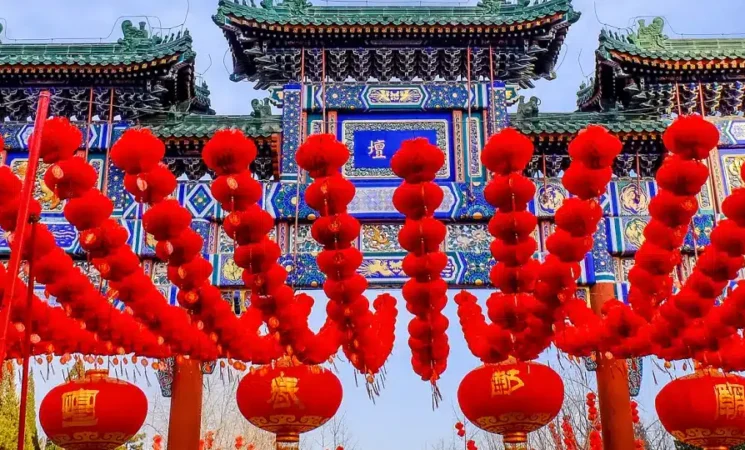31 August 2025, NIICE Commentary 11655
Reeba Khan
In the era of what could be called “the Second Cold War”, where both the USA and China try to shift the global dynamics, and China hopes to gain the advantage of re-shaping the international world order, with the use of its soft power and global diplomacy, one needs to understand the why China wants to lead not just the global south but also be amongst the first runners in the geopolitical realm. “ZhongGuo” (中国), or the Middle Kingdom as China calls itself, does not just mark its position in geographical terms (in ancient times, it was perceived that China was at the center of the Earth) but also implies China as a center for culture, economy, and politics. The concept of Sino-centralism has been in existence for more than 2 millennia now. This Chinese centrality has shaped China's approach towards global governance and its representation on the international stage. Under Mao Zedong's leadership, the idea of the ‘Asian Solidarity’ had emerged, a move to lead Asia, aimed at reducing Western influence and spreading the influence of the “New China”. Now, in the era of Xi Jinping, China is determined to lead the Global South and seeks to use soft power to establish its influence in the new emerging world order, where Asia leads the world.
Even in imperial China, diplomats or ambassadors would be sent to missions, establishing trade, cultural exchanges. This would allow Imperial China to bolster its image as a cultural and economic center. Till 1840, China had remained amongst the major powers of the world, but after the defeat in the First Opium War (1839-1842), it caused China to suffer “the Century of Humiliation”. In 1949, when the Century of Humiliation finally ended with the establishment of the People's Republic of China, since then China has tried to return to its original centrality. The defeat was bitter for the leaders of that period, yet they were sure of China restoring its original centrality. Confucianism, a school of thought that has shaped Chinese culture, promotes the idea of Social hierarchy, and China finds hierarchy natural to its culture and places itself at the apex of the global hierarchy.
In the past two decades, China has emerged as a major power; some would argue that China is the next superpower with a world-class military and the second-largest economy. In contemporary times, China has made attempts to tilt the global order to its advantage and seeks to regain its centrality in global governance and fulfil the destiny of the “Asian Century.” The 21st century is often proclaimed as the “Asian Century,” a period where the political and economic power of Asian nations will overcome the West’s dominance. President Xi Jinping, the most powerful Chinese president since Mao Zedong, has called for China to “lead the reform of the global governance system,” transforming institutions and norms in ways that will reflect Chinese values and priorities. Beijing is pursuing a multifaceted strategy- a step towards global governance. One of the interesting policies is promoting multipolar global governance, where China advocates for justice and equality. With this tactic, China is trying to lead and claim its space in international organisations as well; a clear mark for its approach. The Belt and Road Initiative is China’s mega project, aiming at global infrastructure connectivity, policy coordination, free trade, financial integration, and closer people-to-people ties. The BRI connects the contemporary world; hence, the initiative by the Chinese side is successful in establishing itself as an emerging leader in the current world order.
How Sino-centralism affects India
Sino-centralist worldview, in terms of geopolitics, affects India, as it seeks to be at the forefront in leading the Global South. India, on multiple occasions, has come forth and established itself as a strong, growing economy on the international stage and has presented its national interest with utmost importance. In a time when both the Asian Giants want to lead the global south and influence the new emerging world order, a multipolar world has emerged. Efforts like the Belt and Road Initiative (BRI) have created a path for the Chinese to global interconnectedness and as an epicenter of global commerce.
India must grasp the concept of Chinese centrality and act accordingly. Sino-centralism has been a part of Chinese culture, which is visible even in current Chinese society. There have been instances where Chinese superiority amongst the Chinese population can be seen, which suggests China and its own perceived entitlement to rule the international order. As China puts itself at the apex of the global hierarchy, this has led to national superiority in domestic narratives. India needs to understand the Chinese geopolitical aspirations and their desperation to come across as the leader of the Global South to establish Chinese centrality. In such a paradigm where a leader might not lead for the benefit of others, but their own benefit, the Global South needs to emerge as an advocate for a multipolar global order, to avoid power accumulation in the hands of one.
Reeba Khan is a Research Intern, NIICE Nepal, currently pursuing her Bachelor's of Arts (Chinese Studies) at Jawaharlal Nehru University, India.
The views expressed are the author's personal views.

